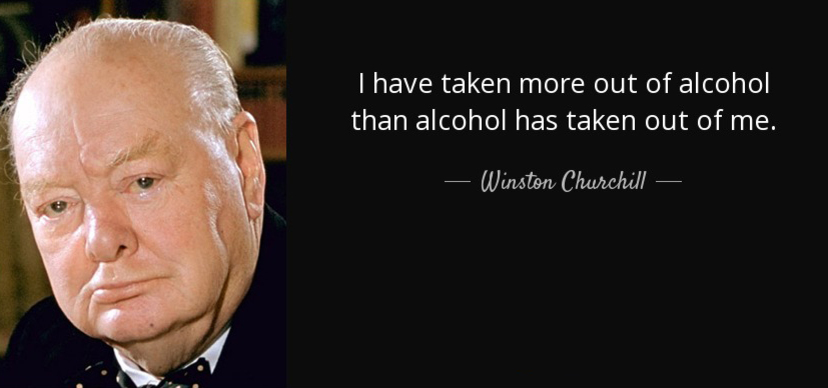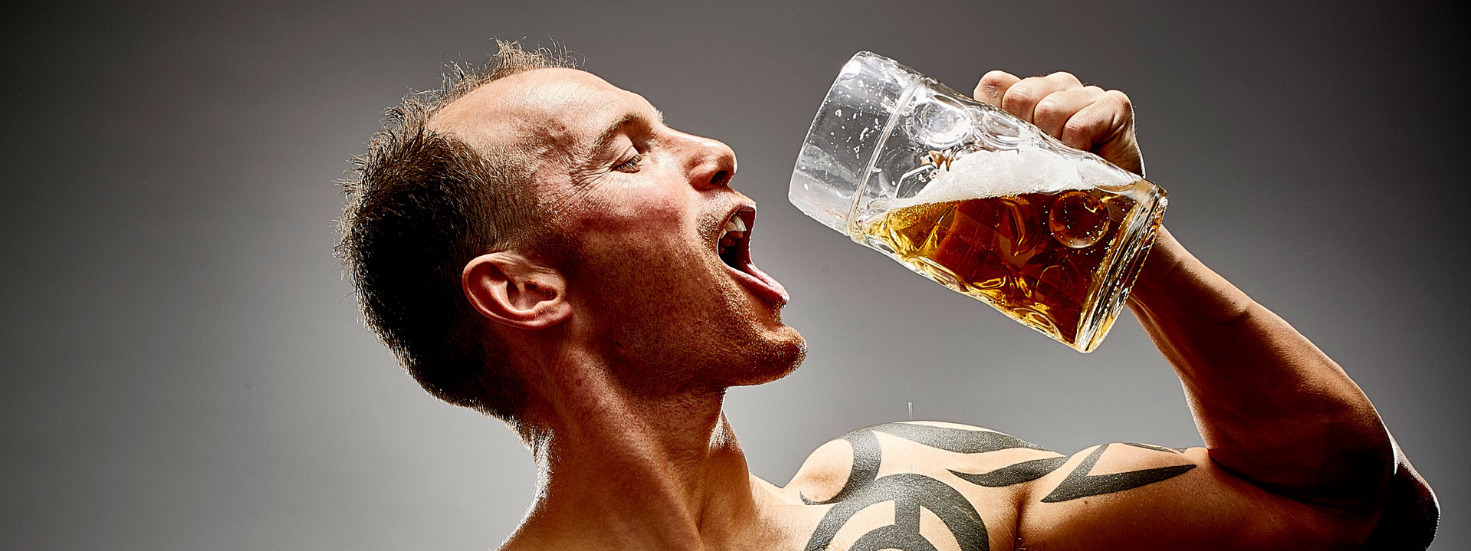Beer & Abs, My Forbidden Loves…
Posted on 22nd January 2020 at 12:29
I have good reason for not taking part in dry January, it isn’t the commitment, I could handle a month off the beer without drama, a few years ago I went six months with no alcohol, and previously I’ve took part in other dry January’s or sober for October etc, and it has nothing to do with me wanting to get hammered in January either, I’ve drank, but not much.
My reason for not doing dry January is because moderation is the thing I struggle with most, I can do tee total, and I can do borderline alcoholic, but trying to be something in-between has always been difficult for me.
Alcohol and I go way back, I have early memories of drinking a sneaky glass of beer with my uncles at family weddings and feeling like a grown up, it tasted nice, it made me feel good, as I grew older I got more and more into drinking beer, at parties with other teenagers, on holidays with friends, and then in the Marines. This is where I became a Commando trained drinker.
The more you do something, the better you get at it, can’t do many press ups? Do them every day, a few times a day, do this for a month, now see how many press ups you can do.
It’s why those same people who chain smoke their bank balance away, are also the same people who coughed and spluttered with the first few cigarettes they ever smoked, but they persevered, they’re not quitters! They kept going and got good at it.
After the Iraq war I drank so heavily I would have black outs, we started mid-day on either a Friday/ Saturday or Sunday (occasionally week nights we drank too) and by evening we where on spirits, by early morning we where on spirits with caffeine, and then eventually I would pass out somewhere and start again the next day. I got into fights, I broke things, and I narrowly avoided the law on some occasions.
Becoming a civvie I slowly began to drink less, but it was still heavy usage, last year I was drinking anywhere from four to ten pints on Friday, Saturday and Sunday (it varied a lot, but most weekends it would be four to six Friday, six to ten Saturday, and four to six Sunday) I also drank on a few week nights too such as when the World Cup was on (am not even a massive football fan) and on our family all-inclusive summer holiday I drank every day from lunchtime onwards.
I didn’t feel drunk but remembering it the next day I knew my speech was slurring, and my family told me that it was like I wasn’t there. My wife never nagged me, but she was patient in telling me often what I already knew, I was drinking way too much.
I still like to enjoy a beer, I don’t plan on going tee total, my goal now is to nail moderation.
Now let me tell you about my other love, fitness, remember all that alcohol I said I drank last year?
Cast your mind back and some of you who’ve followed my social media for a while may also remember this.




I got into photoshoot shape (not stage shape, which is very different) whilst still drinking most weekends. I cut it back a bit in the last few weeks leading up the shoot, but I still drank Friday, Saturday and Sunday.
My biggest changes came through diet, hard work and sweat. The weekend alcohol consumption added about 4000 extra calories I needed to work off.
Exercise and health are things I hold dear, again this goes back to early on in my childhood, I grew up in Cyprus with parents who competed to a very high level in cross country running. I swam in the sea every day, and as I grew older, I got into boxing and became obsessed with exercise. I trained as hard as I could to be fit for the Marines and in the end, I was one of the fittest guys in my troop.
This carried on throughout my career in the military, and it was after the Iraq War I realised I wanted to do the thing I loved most for a living (good job I chose personal trainer and not landlord!)
The problem as you may have guessed is how starkly these two things contradict one another, the more I drink the less healthy I become, the more I work hard on my health the less I can enjoy alcohol. Or so it may seem.
There must be compromise.
So, this is it.
Moderation, I drink only one day a week, and I set the amount I drink and stick to it.
It’s not been easy so far, but it’s getting easier, most of my drinking is habitual, it itches a bit the first few times you don’t do it, but then after a while it starts to become easier, and you even wonder why you drank so much in the first place.
So, this is where I am right now, am not saying it’s the right answer, but I’m trying it out to see how it goes, I know it’s either this, tee total, or debatably an alcoholic.
What I’m doing right now is the only sensible choice I feel I have and that I can commit too (once again, am not saying it’s right for everyone)
I think there may be plenty of other guys like me, people who know that they don’t feel a need to neck a bottle of whisky first thing every morning, and yet still consider the possibility that alcohol is an issue for them.
I think there are plenty of guys who have similar stories to mine and are beginning to consider how they can take ownership of alcohol instead of it taking ownership of them.
So, what are the health risk of alcoholism?
Where do we start? Any amount of alcohol carries with it some risk, for example there are plenty of people driving the day after a session who may or may not be aware that they are over the limit, so the first risk is increased risk of motor injury to you and others, and with that a risk for ruining your life, losing your job, a potential prison sentence, just because you don’t head out the door with your car keys after last orders doesn’t mean you’re not at risk.
Then of course there are the social risk, the biggest emotional traumas in my life have usually come around through alcohol, the things I have done or the words I have said which seemed like a good idea at the time. Turns out they were not.
This leads me onto psychological risk, why do we drink? Am sure everyone has a different reason, I would maintain that my main motivation is an enjoyment of beer however I can’t deny there is a mental release from the general pressures of work and life in general.
But that release is short lived, alcohol can never solve the issues we should be facing up to.
And of course, there is increased risk of injury full stop, falling down stairs, cutting yourself chopping veg, burning yourself whilst cooking, these risks apply not just to you but to all those around you. This risk is increased the next day as alcohol diminishes sleep quality leading to lower levels of concentration and focus.
Then there is cost, I’ve worked out that if I cut out must two nights of drinking a week at a conservative estimate of £10 each night ( I know it’s sometimes more than that) then I could save over a thousand pounds each year, just putting it into perspective like that makes me realize how selfish I have been, this is money that could be spent on doing things as a family, or nice nights out with my lovely wife, or even buying even more coats for my hound.
What about the long-term health risk?
The odd weekend binge on a stag do or hen do isn’t the big issue for most people, it’s the built up accumulation over a lifetime that leads to severe health consequences.
High risk of cancer, elevated blood pressure, increased likelihood of heart disease, obesity. It goes on and on, your probably know all this already.
According to professor Nutt a neuropsychopharmacology expert:
A third of people who arrive at a liver unit with damage do not meet the criteria for alcoholism, they have simply drunk too much over time. He prefers to avoid the terms alcoholic or alcohol dependency, as it’s not how most people see themselves.
These people are not hiding bottles of whisky around the house to hide how much they drink from their family, instead they see themselves simply as people who enjoy a few drinks now and then to unwind.
It’s more helpful to look at our usage and consider where we might realistically cut down.
A recent lancet paper showed that even a reasonable decrease for most people could give an extra two years of life, and that heavy drinkers who might not see themselves as alcoholics could well be shaving a full decade or in some cases more of their life expectancy.
What are the health benefits?
Before I continue it’s important to note that these benefits can be overplayed, when studies show that people who drink moderately are living longer than people who are tee total we must consider the possibility that some of the population who class themselves as tee total are in fact ex alcoholics who had to quit drinking after doing some considerable perhaps irreparable damage to their body.
But anyhow, if a person can drink moderately, then…
Alcohol could potentially lower heart disease risk, perhaps because of vasodilation in constricted veins, or maybe because of it’s stress lowing effects, or even perhaps because of some of the anti-oxidants in certain alcohols such as red wine.
A Harvard study for public health found that moderate amounts of alcohol can improve levels of HDL cholesterol, which is known to reduce risk of heart disease.
A Spanish study found that moderate levels of red wine consumption per week also reduced the risk significantly of developing a cold.
There are plenty of other studies claiming that moderate alcohol consumption could lower risk of diabetes etc, however there is something else to consider here, those who drink moderately, are also the kind of people to engage in health seeking behaviours. Most likely they also eat five portions of fruit and veg a day, exercise regularly and get a good night’s sleep. I can’t say that for sure of course, but I think any claims of long-term alcohol benefits should consider this possibility.
There are significant nutrients in beer, most notably B vitamins, magnesium, folate, phytochemicals etc, but once again, and not wishing to be a broken record here, these are most likely outweighed by excessive consumption.
So am I an alcohol dependant? And what exactly is moderation?
According to drink.org, those who feel unable to relax without alcohol, who experience a change in mood when denied a drink , are most likely alcohol dependant. I may have felt like this at times, but am still not sure I fit this criteria, I can go without a drink, and so far am starting to get more used to it. As I said earlier, I feel my drinking has mostly been habitual, and habits are strong in behaviour formation.
From twin studies it’s been discovered that 60% of alcohol dependency is genetic, and the rest comes down to environment and upbringing, if you have alcoholic abuse in your family line then there is a good chance you may be at risk of developing this yourself.
So what is moderation?
According to the chief medical officer a sensible intake for low risk would be 14 units per week, which is about 6 pints of beer or wine, or 14 measured servings of 40% spirit.
I’ve been drinking over five times that amount for a few years now, and there is no doubt that if I keep this up I’ll pay a price for it at some point.
So I’m cutting back, I’ll still (for now) drink more than I should, it’s not the best but it’s a big compromise for me, I’ll drink the 14 units per week, but instead of spreading it over three or four nights (one to two beers a night) I’ll be drinking all of them in just one night. Still not the best, but a compromise at least.
I plan to take my time, drink slowly and appreciate each drop, have some water between drinks and stop when the beer runs out.
End Note
In reviewing this blog (imagine how bad the spelling and grammar would be if I didn’t do this!) I wondered if I should state my consumption as a little lower, I worried that people might judge me as a hypocrite, a health and fitness professional engaging in very unhealthy habits.
That may be true, but bear a few things in mind, I’m 6 foot two and over fourteen stone, I can put away more alcohol easier than many others of a smaller stature and most likely it won’t do me as much harm, I also do a lot of other things right, such as eating plenty of veg, exercising often, meditation and general health and wellbeing maintenance. None of this excuses my alcohol habit, I don’t need an excuse, it’s not healthy and this is why I’m choosing to address it. I hope that in writing this, I have hit home with a few other people who can relate to my story, because I think there are a lot more people like me out there.
I’m now training for a photoshoot in June, I planned on one before Christmas but had to cancel due to a hernia operation, I’ll be sticking to my moderation plan as best I can, if you’d care to join me then sign up here.
In a tongue in cheek way I’ll give the last words to Winston Churchill, who drank from morning till night near enough every day of his adult life.

Share this post:





